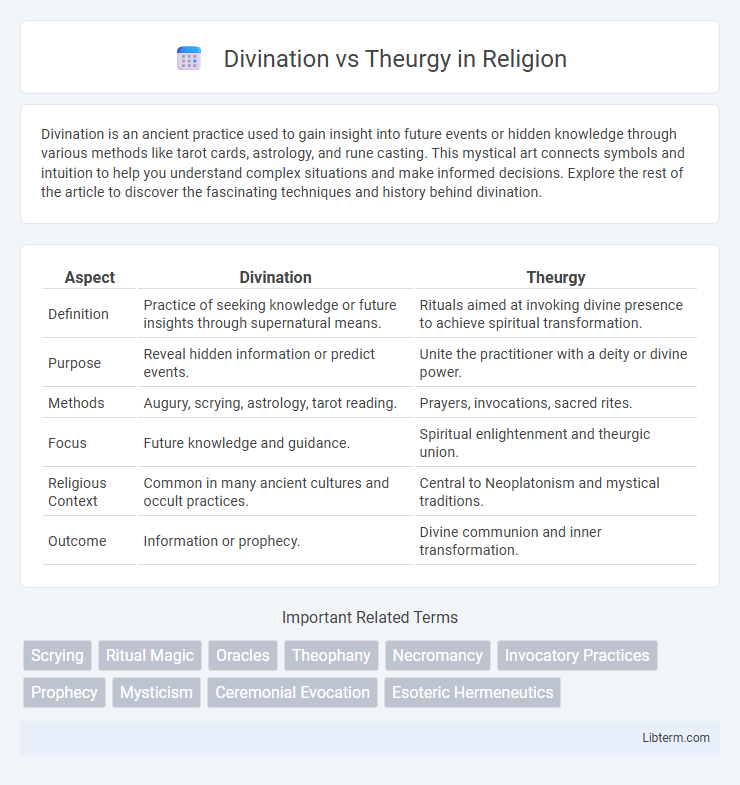Divination is an ancient practice used to gain insight into future events or hidden knowledge through various methods like tarot cards, astrology, and rune casting. This mystical art connects symbols and intuition to help you understand complex situations and make informed decisions. Explore the rest of the article to discover the fascinating techniques and history behind divination.
Table of Comparison
| Aspect | Divination | Theurgy |
|---|---|---|
| Definition | Practice of seeking knowledge or future insights through supernatural means. | Rituals aimed at invoking divine presence to achieve spiritual transformation. |
| Purpose | Reveal hidden information or predict events. | Unite the practitioner with a deity or divine power. |
| Methods | Augury, scrying, astrology, tarot reading. | Prayers, invocations, sacred rites. |
| Focus | Future knowledge and guidance. | Spiritual enlightenment and theurgic union. |
| Religious Context | Common in many ancient cultures and occult practices. | Central to Neoplatonism and mystical traditions. |
| Outcome | Information or prophecy. | Divine communion and inner transformation. |
Understanding Divination: Definition and Origins
Divination is the practice of seeking knowledge or insight about future events or hidden information through supernatural means, with origins tracing back to ancient civilizations such as Mesopotamia, Egypt, and Greece. It involves various methods like astrology, tarot reading, and scrying, aiming to interpret signs or symbols believed to be messages from divine forces or the subconscious mind. Theurgy differs by focusing on invoking divine presence or powers for spiritual transformation rather than predicting outcomes.
Theurgy Explained: Meaning and Historical Context
Theurgy is a metaphysical practice aimed at invoking divine powers to achieve spiritual transformation and enlightenment, rooted in Neoplatonic philosophy and ancient Pagan traditions. Historically, theurgy emerged as a method to unite the human soul with the divine through rituals, prayers, and symbolic acts, contrasting with divination's focus on predicting the future. Its significance is evident in the works of philosophers like Iamblichus, who emphasized theurgy as a sacred art facilitating communion with gods beyond mere fortune-telling.
Core Philosophies: Divination vs Theurgy
Divination centers on obtaining knowledge about the future or the unknown through supernatural means, relying on signs, symbols, or rituals to interpret divine messages. Theurgy involves invoking divine powers or spiritual beings to achieve union with the divine and facilitate spiritual transformation. While divination primarily seeks information, theurgy emphasizes active participation in divine processes to attain enlightenment or salvation.
Methods and Practices: Tools and Rituals
Divination methods encompass tools such as tarot cards, runes, pendulums, and scrying mirrors used to interpret hidden knowledge or future events through symbolic readings and intuitive insight. Theurgy practices involve complex rituals including invocations, prayers, and ceremonial rites aimed at invoking divine presence or spiritual entities to achieve spiritual transformation or enlightenment. Both rely heavily on symbolic instruments and structured ceremonies, but divination emphasizes interpretive tools for guidance, whereas theurgy focuses on active communication and alignment with divine forces.
Divine Communication: Seeking Knowledge vs Union
Divination involves methods such as scrying, tarot, or astrology to receive knowledge or guidance from divine sources, emphasizing the pursuit of hidden truths and future insights. Theurgy centers on ritual practices designed to invoke the presence of deities, aiming for spiritual union and transformation rather than mere information gathering. While divination seeks to communicate with the divine for understanding, theurgy prioritizes establishing an experiential connection to attain divine essence.
Goals and Outcomes: Prediction vs Transformation
Divination aims to predict future events or uncover hidden knowledge through rituals, signs, or tools, providing guidance and insight to influence decision-making. Theurgy focuses on spiritual transformation and communion with divine forces, seeking to elevate the practitioner's soul and achieve unity with higher powers. While divination centers on foreseeing outcomes, theurgy emphasizes profound inner change and divine empowerment.
Cultural Influences and Traditions
Divination and theurgy both stem from ancient spiritual practices, with divination primarily focused on interpreting signs to predict future events across cultures such as Mesopotamian, Greek, and Chinese traditions. Theurgy involves ritualistic invocation of divine powers, deeply rooted in Neoplatonism and Hermetic traditions, emphasizing transformation and unity with the divine. These cultural influences highlight divination's role in decision-making and theurgy's emphasis on spiritual elevation within their respective historical contexts.
Ethical Considerations in Divination and Theurgy
Ethical considerations in divination revolve around the responsible use of foresight and respecting individuals' free will, ensuring predictions do not manipulate or harm others. Theurgy emphasizes ethical purity and intention, aiming to unite practitioners with divine forces through morally sound rituals that promote spiritual growth and communal well-being. Both practices demand a deep commitment to integrity, transparency, and respect for the boundaries between human agency and supernatural influence.
Modern Interpretations and Applications
Modern interpretations of divination emphasize its role as a psychological tool for insight and decision-making, often incorporating Tarot, astrology, and runes. Theurgy is practiced as a spiritual discipline aimed at personal transformation and connecting with higher powers, frequently seen in contemporary esoteric and mystical traditions. Both practices intersect in modern spirituality, blending ritualistic elements with introspective methods to foster self-awareness and metaphysical growth.
Choosing Your Path: Divination, Theurgy, or Both?
Choosing between divination and theurgy depends on your spiritual goals and practice style; divination focuses on interpreting signs and gaining insight through tools like tarot cards or runes, offering guidance and foresight. Theurgy involves invoking divine powers or energies to achieve spiritual transformation and enlightenment, emphasizing ritual and communion with higher beings. Combining both paths allows practitioners to both seek knowledge through divination and actively engage with divine forces for personal growth and mystical experience.
Divination Infographic

 libterm.com
libterm.com